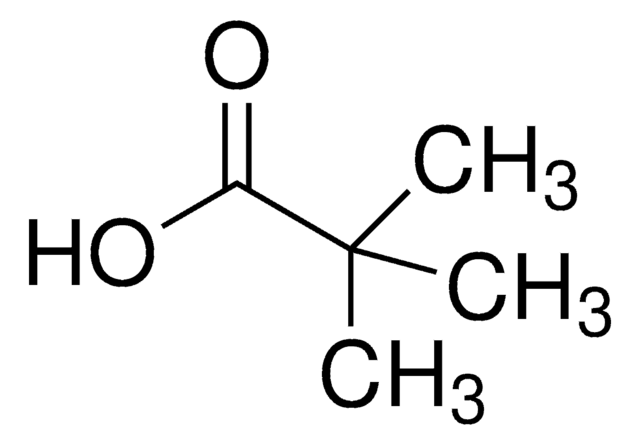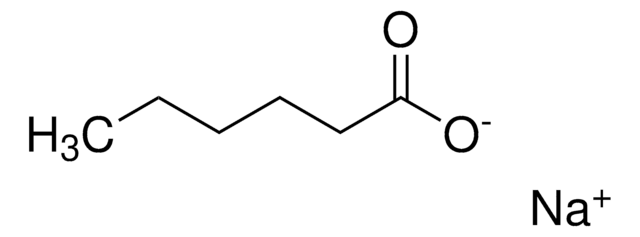153745
Hexanoic acid
≥99%
Synonym(s):
Acid C6, Caproic acid
About This Item
Recommended Products
vapor density
4 (vs air)
vapor pressure
0.18 mmHg ( 20 °C)
Assay
≥99%
form
liquid
refractive index
n20/D 1.4161 (lit.)
bp
202-203 °C (lit.)
mp
−4 °C (lit.)
solubility
H2O: slightly soluble
diethyl ether: easily soluble
ethanol: easily soluble
density
0.927 g/mL at 25 °C (lit.)
Organoleptic
pungent
SMILES string
CCCCCC(O)=O
InChI
1S/C6H12O2/c1-2-3-4-5-6(7)8/h2-5H2,1H3,(H,7,8)
InChI key
FUZZWVXGSFPDMH-UHFFFAOYSA-N
Looking for similar products? Visit Product Comparison Guide
General description
Application
- To prepare polyethylene glycol derived nanomicelles as a non-viral gene carrier.
- As a starting material to synthesize an amino acid L-norleucine.
- As a reactant to prepare 4-methoxy phenyl hexyl ketone through Friedel−Crafts acylation of anisole using Hβ zeolite-based catalyst.
- As a template in the preparation of highly conducting thin polypyrrole coated alumina composite particles.
Signal Word
Danger
Hazard Statements
Precautionary Statements
Hazard Classifications
Eye Dam. 1 - Skin Corr. 1C
Storage Class Code
8A - Combustible corrosive hazardous materials
WGK
WGK 1
Flash Point(F)
215.6 °F - closed cup
Flash Point(C)
102 °C - closed cup
Personal Protective Equipment
Certificates of Analysis (COA)
Search for Certificates of Analysis (COA) by entering the products Lot/Batch Number. Lot and Batch Numbers can be found on a product’s label following the words ‘Lot’ or ‘Batch’.
Already Own This Product?
Find documentation for the products that you have recently purchased in the Document Library.
Customers Also Viewed
Our team of scientists has experience in all areas of research including Life Science, Material Science, Chemical Synthesis, Chromatography, Analytical and many others.
Contact Technical Service












